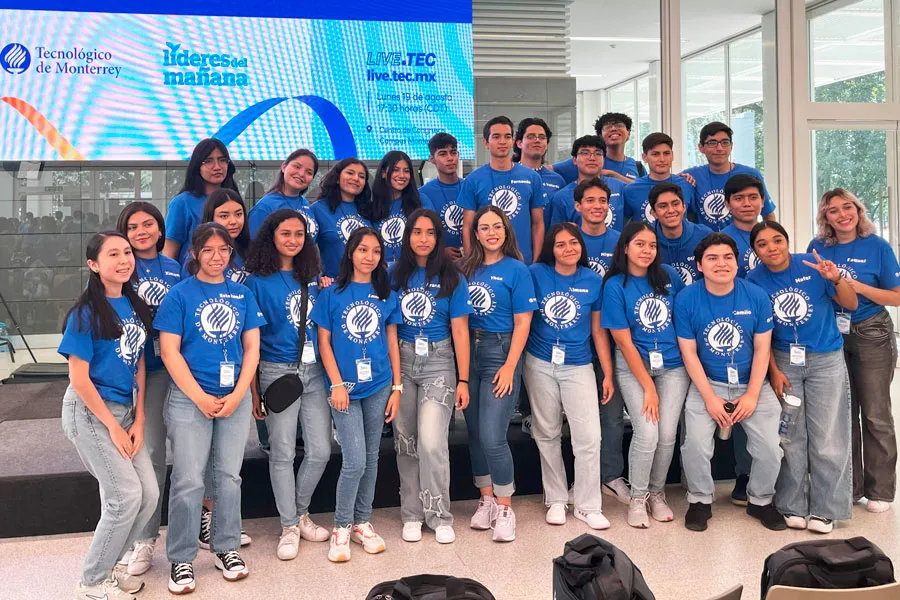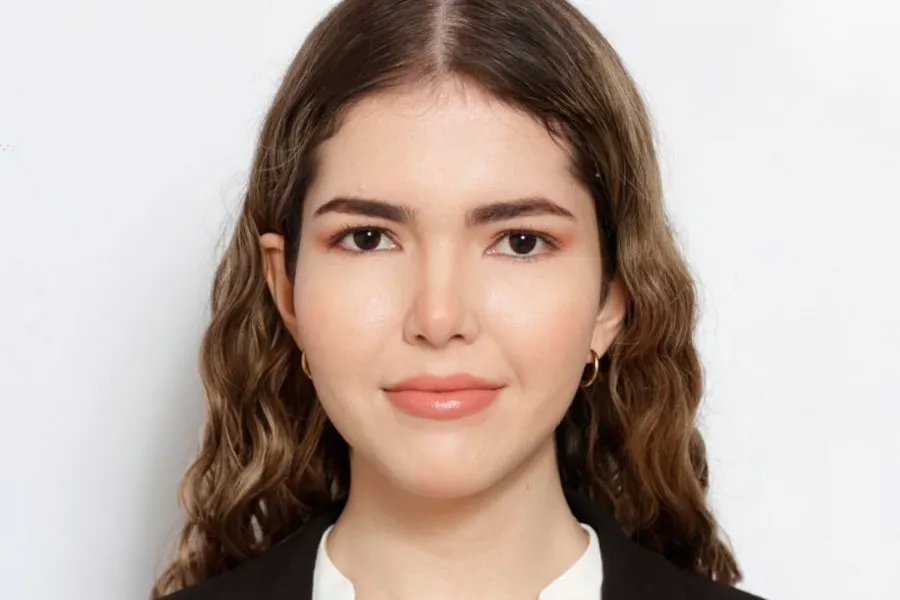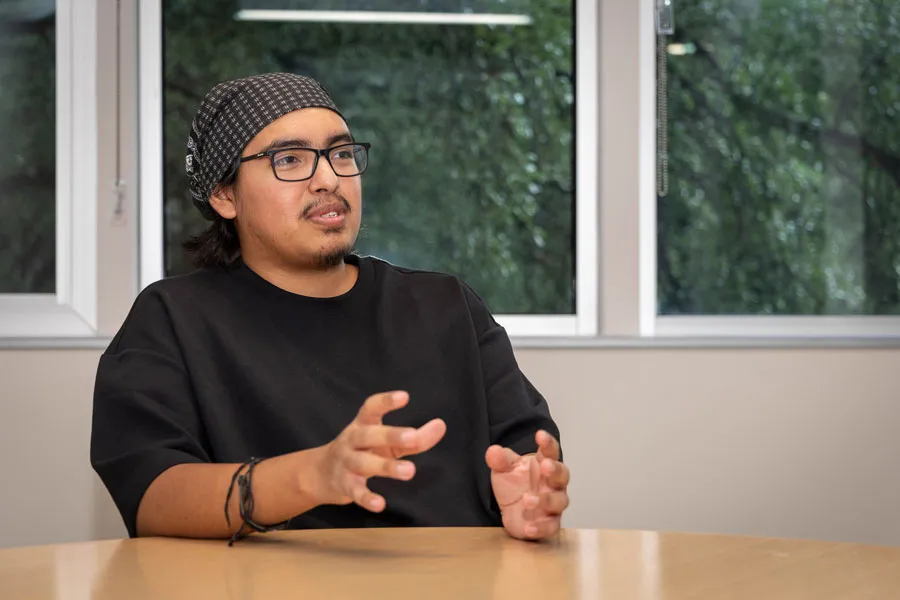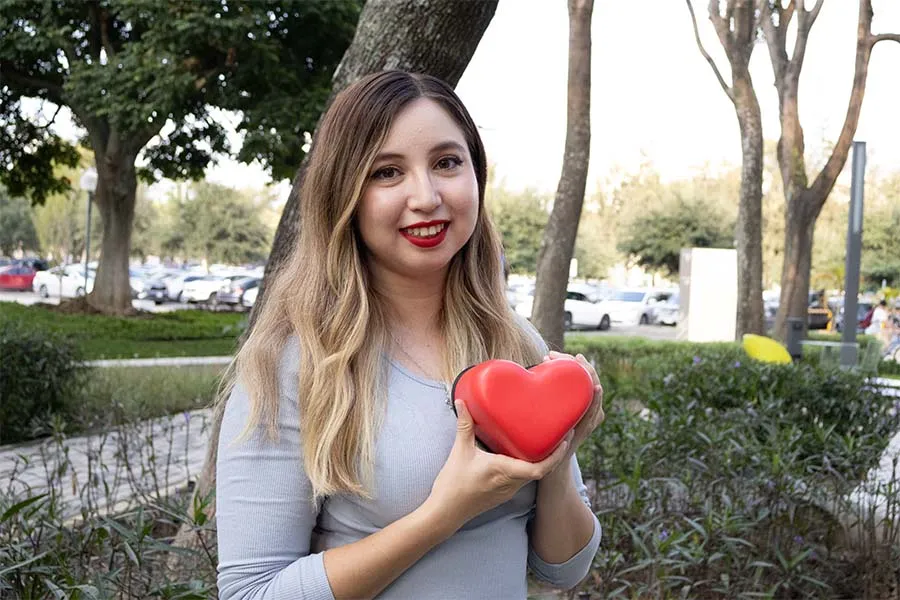Leaders of Tomorrow (LDM, initials in Spanish) is one of Tecnológico de Monterrey’s flagship programs that attracts students with outstanding academic talent, social leadership skills, and a commitment to transforming reality by covering 100% of their tuition fees.
According to Pablo Ayala, the Tec’s Director of Social Impact, young people enrolled in this program have one thing in common: they are exceptional students who hunger for challenges.
“Leaders of Tomorrow is a platform that allows us to bring on academically gifted youngsters who, more relevantly, possess the characteristics of social leaders,” Ayala points out.
Of the more than 2,300 young people who have joined this program since 2013, 952 are engaged in their professional studies and 1,375 have already graduated.
As 200 students were welcomed to the 12th year of the program on August 18, 2025, graduates and current students reflect on their own trajectories and explain their transformation initiatives.

Why does the Tec have the Leaders of Tomorrow program?
With Leaders of Tomorrow, Tecnológico de Monterrey seeks to contribute to a more egalitarian, prosperous, fair, and talent-based society.
Donors and partners have supported more than 2,300 Mexican and Latin American students for twelve years to develop their leadership skills at the Tec and help them become agents of change.
Twelve years from its start, 59% of this academic community have graduated and moved on to projects with social, economic and environmental impact, while the remaining 41% are still studying.
CONECTA presents the stories of several participants in this program, who reflect its purpose through their academic training, profession, and social projects.
The creator of a technological project to tackle obstetric risk
Sebastián de Jesús Cruz assembled his first computer at the age of fourteen, getting the parts on his own and watching videos explaining how to put everything together and check their compatibility.
Now a student of computer technology engineering on the Mexico City campus, Cruz is in the eleventh generational group of the program. He has created a web page that helps pregnant women conduct self-diagnosis of obstetric risk.
The idea arose from a close aunt losing her baby, which hit him hard and encouraged him to address the problem.
Cruz’s goal was to reduce maternal mortality and help low-income patients by means of an interactive digital platform capable of helping identify complications during pregnancy.
“The point of the page is to provide information and guidance in a much faster way without having to stand in line or go directly to the hospital; besides, it’s also very difficult for pregnant mothers to move from one place to another,” he emphasized.
“I’m a student, a brother, a son, even an uncle, but above all I want to serve as an example. I want to leave my mark on students following in my footsteps and those who have gone before.”
Culture, community, and technology
Leslye Rivera, who hails from Ciudad Obregón, Sonora, enrolled in the third generational group of the program in 2016.
Although she began her studies on her hometown campus, she soon moved to Monterrey, where she completed her biotechnology engineering degree in 2021.
A recurring aspect of her time in the program was the connection she felt between culture and social commitment.
In Monterrey, she became increasingly involved in initiatives like Escalando Fronteras, a project in which values and socio-emotional skills were taught to children from at-risk communities through rock climbing.
During this time, she also collaborated on the creation of the Leader to Leader prize draw.
“That initiative became one of the most emblematic activities for sustaining the program’s growth.”
Today, Leslye works in the technology sector as the Data Operations Manager at Samsara, where she applies her artificial intelligence and data management skills to improve the safety and sustainability of physical operations.
“I really like working with databases, artificial intelligence, and new technologies. I’ve always liked learning new things,” she says.
Apart from her professional development, Rivera confirms that she maintains a strong link with the Leaders of Tomorrow community and tries to attend institutional events and take part in activities organized by more recent generational groups.
“I love having highly inspiring, resilient colleagues who don’t give up despite the difficulties. It’s something we have in common and are constantly learning about.
“The only thing that is truly impossible is something you don’t try. Even if it’s scary or you feel uncertain, the process always leaves you something valuable,” she advises younger students.

Using creativity and resilience to transform with art
From an early age, Antonio Martínez, known as “Toro,” grew up surrounded by educational, social, and artistic initiatives thanks to the influence of his mother, a preschool teacher, and his grandfather.
That intimacy with art and teaching marked him deeply, he confided to CONECTA.
“I’ve always been deeply moved by how art can push people to learn and express themselves.”
In high school, his vocation became apparent with his dream of turning an empty classroom into a space for his classmates to create audiovisual and artistic projects.
Initially, this idea faced resistance but eventually gained support.
“A friendly director quietly pointed me in the right direction. We worked there because we wanted a place to experiment and create,” he laughs shyly.
On his arrival on the Monterrey campus, “Toro” ran into personal and professional challenges that forced him to put his original initiative on hold; however, he found renewed impetus when he began taking photos of plays at the Luis Elizondo Auditorium.
“The first photo that made me want to devote myself to this was taken at a friend’s play. I captured the expression, the light, the colors... everything communicated something profound,” enthuses the 20-year-old student, a member of Leaders of Tomorrow’s 10th generational group.
Antonio is currently working on Garabatos, a space dedicated to disseminating artistic and cultural projects in the country. Garabatos is part of his larger project, Astro, a creative agency that foments artistic initiatives; he is also part of the Storytellers program at the Tec.
“I believe that art is indispensable for human development and for conveying ideas aimed at social transformation,” said the journalism student.
He gives new Leaders of Tomorrow students a piece of advice garnered from his own experience: “Try little by little, find what you really like, and don’t be afraid to drop something that doesn’t convince you. That’s also a way of respecting yourself.”

Saving lives and inspiring others to do the same
As a child, thanks to her father, Tec graduate Mariana Delgado had already begun exploring the possibilities offered by science, thereby discovering her liking for engineering and mathematics.
Having discovered that this was the field she was most passionate about, she envisioned her future in the creation, innovation, and development of projects that unified science and social action.
Consequently, having studied at PrepaNet and subsequently doing mechatronics engineering on the Guadalajara campus, Delgado came up with what we now know as RCPráctica.
This venture came to life with the mission of democratizing CPR (cardiopulmonary resuscitation) learning and making it accessible to the entire population through this medical training device.
“At the Tec, I found the tools, the inspiration, and the people who helped me take my project from an idea to a life-saving international initiative.
The Tec graduate explains how, thanks to LDM, she learned to transform problems into solutions, combining creativity and initiative with knowledge and skills to develop projects with global impact.
“I had professors who trusted me and gave me the resources to create a product and take it to market. What started as a homework assignment turned into a technology startup that develops innovations to save lives.
“The Leaders of Tomorrow program taught me that it is possible to fulfill my dreams and that my actions can reach out reciprocally to my community. There I came up with how to make RCPractica a reality, grow, and start saving lives”.

Passion for science, mathematics, and swimming
According to Adrián Israel Galicia, before he even thought about university, he saw that the subjects both his classmates and he had found hard to learn were science and mathematics.
Although Adrián considers both mathematics and data science to be essential, he pointed out that in the past he had had classmates who didn’t voice their doubts in the classroom because they were embarrassed.
“Mathematics is one of the most fundamental disciplines for developing any aspect of our lives, but the modern world requires not only mathematicians, but specialists.
“I realized that my classmates and friends felt more comfortable asking me questions than asking a teacher,” recalled the young man from the State of Mexico campus.
This led our student of data science and mathematics engineering to come up with Scientix, an initiative to give classes focused on the technological and parallel topics “his students” had brought up.
In addition to his academic project impacting around 100 students thanks to his mentoring, Adrian is also a fine athlete; he competed in a group swimming event during the Acapulco Guadalupano Marathon in 2022.
“Swimming is a very individual thing, but when you train and compete as part of a team, you feel more pressure to give your best effort and I find that even inspiring, wouldn’t you?” said the LDM 11th generational group student with a smile.
Integral supervision to transform experiences
For LDM operations manager Hermila Gisela Loya, the program essentially involves supervision and a community that cares for the students selected at each stage of their university education.
“From the attraction and selection process to the socio-emotional and academic follow-up, the program seeks to provide each student with a memorable experience.
“For me, Leaders of Tomorrow is about filling lives and returning all these capabilities, ideas, and innovations to the world because these are kids with completely disruptive proposals.”
Loya emphasized that the chosen students usually display all-round development: not only do they excel in academics, but also entrepreneurship, art, sports, or social projects.
“They are top students who come full of initiative, are self-sufficient, and take advantage of all the opportunities offered by the institution,” she added.
The richness of every yearly intake can also be perceived in the way they interact with each other, she said, because “when they get together, they share ideas that produce project alternatives or even new initiatives.
“The creativity and impact they generate is only possible because there is something more powerful pushing them on.”
Moreover, Loya and Ayala agree that program graduates also maintain a very close bond with the community whether sharing job opportunities or continuing their studies abroad.
“They’re very inquisitive and always seeking growth and improvement; they even continue to support this community from Europe,” Gisela highlighted when talking about the distinct characteristics of the Tec’s Leaders of Tomorrow.
A platform for leadership with a social impact
For Ayala, the Leaders of Tomorrow program is first and foremost a platform for human and professional development.
“We are fortunate and blessed to generate growth opportunities for academically gifted youngsters with social leadership skills.”
The essence of the program, he explained, is to recognize those who combine academic excellence with social commitment.
“We’re not only searching for gifted young minds, but also hearts that are willing to work for the benefit of the community.”
In this regard, he noted that nearly half of the graduates have promoted social innovation projects with an impact on different communities and mentioned issues ranging from sustainability, health, and education to entrepreneurship.
“Students’ backgrounds also have an effect on their proposal designs. We have seen initiatives that recover the knowledge of native peoples or that respond to environmental problems in their regions,” he explained.
Ayala also stressed the importance of young people understanding social innovation not as a requirement but as a way to put their talents at the service of humanity.
“It’s a case of using creativity and professional capacity to solve the problems that affect us as a society.
This year, we received more than 31,000 applications and just 200 students were chosen. That makes Leaders of Tomorrow a highly demanding and selective program,” he said.
Ayala referred to the upcoming welcoming ceremony as a symbol of hope.
“This year, we received more than 31,000 applications and just 200 students were chosen. That makes Leaders of Tomorrow a highly demanding and selective program.” - Pablo Ayala
The program’s impact on the community
The first graduates of this program have taken their studies further in areas of academic excellence or have returned to their communities to head up transformative projects and collaborate on key projects and initiatives in different organizations.
The call for young people from Mexico and Latin America is issued once a year in August.
In 2022, the call was issued in eight Central American countries for the first time.
Currently, seven students from El Salvador, Guatemala, Honduras, Panama, and the Dominican Republic form part of the Leaders of Tomorrow program.
At its inception, Leaders of Tomorrow was driven by the generosity of twenty donors.
A decade later, the program has more than 14,000 donors, the Leaders of Tomorrow themselves, students, professors, employees, Tec graduates, volunteers, and citizens who participate through Tec prize draws, in addition to companies, organizations, and foundations.
YOU MAY ALSO BE INTERESTED IN:





